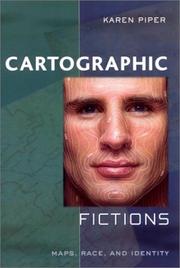| Listing 1 - 6 of 6 |
Sort by
|
Book
Year: 1664 Publisher: London : Printed for Francis Cossinet ...,
Abstract | Keywords | Export | Availability | Bookmark
 Loading...
Loading...Choose an application
- Reference Manager
- EndNote
- RefWorks (Direct export to RefWorks)
eebo-0018
Longitude --- Astronomy --- Prime meridian.
Book
Year: 1883 Publisher: [Berlin : P. Stankiewicz' Buchdruckerei,
Abstract | Keywords | Export | Availability | Bookmark
 Loading...
Loading...Choose an application
- Reference Manager
- EndNote
- RefWorks (Direct export to RefWorks)

ISBN: 0813530725 9780813530727 Year: 2002 Publisher: New Brunswick Rutgers university press
Abstract | Keywords | Export | Availability | Bookmark
 Loading...
Loading...Choose an application
- Reference Manager
- EndNote
- RefWorks (Direct export to RefWorks)
"Cartographic fictions" looks at maps in relation to journals, correspondence, advertisements, and novels by authors such as Joseph Conrad and Michael Ondaatje. In her innovative study, Karen Piper follows the history of cartography through three stages: the establishment of the prime meridian, the development of aerial photography, and the emergence of satellite and computer mapping (GIS). Piper follows the cartographer's impulse to "leave the ground" as the desire to escape the racialized or gendered subject. With the distance that the aerial view provided, maps could then be produced "objectively," that is, devoid of "problematic" native interference. Piper attempts to bring back the dialogue of the "native informant," demonstrating how maps have historically constructed or betrayed anxieties about race.
Aerial photography in geography --- Cartography --- Geographic information systems --- Longitude --- Social aspects --- Prime meridian
Book
ISBN: 0674978951 0674978935 9780674978935 9780674088818 0674088816 Year: 2017 Publisher: Cambridge, MA
Abstract | Keywords | Export | Availability | Bookmark
 Loading...
Loading...Choose an application
- Reference Manager
- EndNote
- RefWorks (Direct export to RefWorks)
Charles Withers explains how the choice of Greenwich to mark 0° longitude solved problems of global measurement that had engaged geographers, astronomers, and mariners since ancient times. This history is a testament to the power of maps, the challenges of global measurement, and the role of scientific authority in creating the modern world.
Meridians (Geodesy) --- Geographical positions --- Positions, Geographical --- Geodesy --- Geospatial data --- Grids (Cartography) --- Latitude --- Longitude --- Mathematical geography --- Lines, Meridian --- Meridian lines --- History. --- Prime Meridian --- 0⁰ meridian --- Greenwich, Meridian of --- Meridian of Greenwich --- Zero degrees meridian --- Zero meridian
Book
ISBN: 9780228009634 0228009634 0228009642 9780228009641 Year: 2022 Publisher: Montreal Kingston London Chicago
Abstract | Keywords | Export | Availability | Bookmark
 Loading...
Loading...Choose an application
- Reference Manager
- EndNote
- RefWorks (Direct export to RefWorks)
Until the nineteenth century all time was local time. The invention of railways and telegraphs, however, created a newly interconnected world where, suddenly, the time differences between cities mattered. This book is an exploration of why we tell time the way we do, demonstrating that organizing a new global time system was no simple task.
Clocks and watches --- Time --- Time measurements. --- Time measurements --- History. --- Social aspects. --- History. --- American. --- Annie Maunder. --- British. --- Canadian history. --- Charles Piazzi Smyth. --- Cleveland Abbe. --- George Airy. --- Greenwich. --- Indigenous. --- John Couch Adams. --- Kikuchi Dairoku. --- Martial Bourdin. --- Ruth Belville. --- Sandford Fleming. --- Simon Newcomb. --- William Allen. --- William Chistie. --- William Parker Snow. --- astronomy. --- business. --- computers. --- day. --- daylight savings. --- diplomacy. --- global. --- great pyramid. --- history. --- international meridian conference. --- local time. --- longitude. --- metric system. --- prime meridian. --- railway time. --- royal observatory. --- science. --- standard. --- technology. --- time-sense. --- time. --- timekeeping. --- transit venus. --- universal. --- zones.
Book
ISBN: 1283277441 9786613277442 0520948157 9780520948150 9781283277440 9780520260993 0520260996 6613277444 Year: 2011 Publisher: Berkeley University of California Press
Abstract | Keywords | Export | Availability | Bookmark
 Loading...
Loading...Choose an application
- Reference Manager
- EndNote
- RefWorks (Direct export to RefWorks)
Combining original historical research with literary analysis, Adam Barrows takes a provocative look at the creation of world standard time in 1884 and rethinks the significance of this remarkable moment in modernism for both the processes of imperialism and for modern literature. As representatives from twenty-four nations argued over adopting the Prime Meridian, and thereby measuring time in relation to Greenwich, England, writers began experimenting with new ways of representing human temporality. Barrows finds this experimentation in works as varied as Victorian adventure novels, high modernist texts, and South Asian novels-including the work of James Joyce, Virginia Woolf, H. Rider Haggard, Bram Stoker, Rudyard Kipling, and Joseph Conrad. Demonstrating the investment of modernist writing in the problems of geopolitics and in the public discourse of time, Barrows argues that it is possible, and productive, to rethink the politics of modernism through the politics of time.
Time --- Modernism (Literature) --- Time in literature. --- English fiction --- Standard time --- Time zones --- Units of measurement --- Frequency standards --- Hours (Time) --- Geodetic astronomy --- Nautical astronomy --- Horology --- Systems and standards. --- Political aspects. --- History and criticism. --- Standards --- 1884. --- adventure novels. --- backward arrow. --- bram stoker. --- cosmopolitan clock. --- empire. --- geopolitics. --- globe. --- greenwich. --- h rider haggard. --- high modernism. --- human temporality. --- imperialism. --- india. --- indian literature. --- james joyce. --- joseph conrad. --- literary criticism. --- modern literature. --- modernism. --- modernist. --- modernity. --- nature of time. --- negri. --- politics. --- prime meridian. --- rudyard kipling. --- science. --- semiotics theory. --- south asian novels. --- standard time. --- temporality. --- time. --- victorian culture. --- victorian literature. --- virginia woolf. --- world standard time.
| Listing 1 - 6 of 6 |
Sort by
|

 Search
Search Feedback
Feedback About UniCat
About UniCat  Help
Help News
News